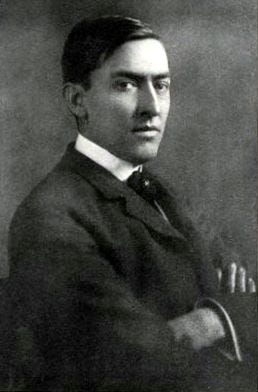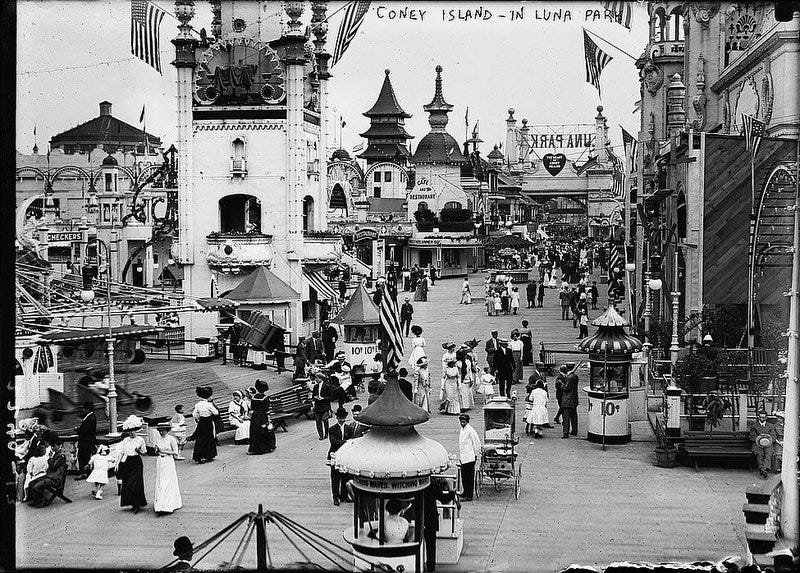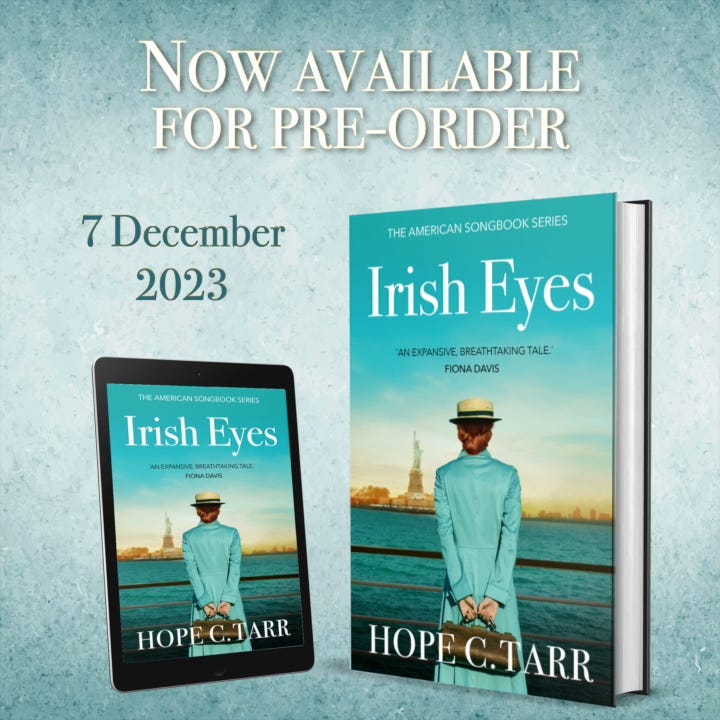I hope everyone had a beautiful Labor Day weekend. Mostly, I spent mine plunked down on the beach reading, mapping out the sequel to Irish Eyes, and giving my monkey brain free rein to roam. The latter led me to musing on dating, mainly how happy I am to be married and not have to do it anymore.
We owe “dating” to newspaper columnist and playwright, George Ade (1866 – 1944), who coined the term in 1896 in his humor column, "Stories of the Streets and of the Town" for the Chicago Record.1 The “dates” Ade observed differed markedly from traditional courting in that the woman met the man in a public place sans chaperone rather than him “calling” at her family’s home.

Like so many other social rituals, dating today looks very different than it did at the turn of the previous century. Long before dating apps and pre-Internet, personal ads, singles paired up one person at a time. With marriage as the end game. For both parties.2 And despite Ade’s cheeky reporting on the vernacular of young Chicagoans, dating was still mostly called “courting” or “stepping out.”
But where did these marriage-minded turn-of-the-century younglings step out to?
In large cities like New York, there was a plethora of pastimes to fit any pocketbook. Dime museums presented flea circuses — yes, that’s really a thing —3 and other crazy curiosities. Vaudeville theaters provided an affordable alternative to Broadway. Competing with vaudeville for the Lower East Side set were the moving pictures. Nickelodeons charged a nickel admission, hence the name, and showed silent films of various subjects and genres, the more tawdry the better. (Check out my post on Thomas Edison’s “Rooftop Murder,” which dramatized the fatal shooting over Broadway beauty, Evelyn Nesbit). Central Park flourished year-round, offering ice skating and sledding and sleighing in the winters.
During the summers, keeping cool was top of mind for everyone. For those who could afford it, rooftop restaurants and concerts were a way to beat the heat while being entertained. The rooftop of the original Madison Square Garden, built by architectural darling of the day, Stanford White, boasted 300 tables, multicolored electric lanterns, and the best views in the city from its 300-foot tower.4
Amusement parks like Coney Island in Brooklyn drew young and old, wealthy and working class. The well-heeled put up at posh hotels like Manhattan Beach Hotel on the park’s far eastern shore. Considered to be the most elegant and fashionable hotel in the United States, it featured 258 guestrooms, restaurants, ballroom and shops.5
The other 99 percent of pleasure seekers came out on the trains as day trippers, mainly on Sunday, everyone’s one full day off. These mostly working- and middle-class men and women, boys and girls flocked to attractions like Luna Park’s “Trip to the Moon” ride and “Fire and Flames” disaster spectacle, the race track at Sheepshead Bay, restaurants and eateries like Feltman's Bavarian Beer Garden and Nathan’s hotdogs6 and of course the beach where umbrellas and bathing suits (!) could be rented for the day.

In Irish Eyes, (December 7, 2023), Rose and her beau, Joe, enjoy a Sunday outing to Coney Island. Enjoy the sneak peek below, and I hope you’ll consider preordering the book.
Coney Island, August 1899
I looked over to Joe sprawled on the beach blanket beside me, nose and cheeks dabbed with Pond’s cream, as were mine. “Another sandwich?” I asked, though he’d had three already.
He paused from blowing into his empty beer bottle. “Maybe just one more.”
He loved to eat almost as much as he loved to drink. Fortunately, he was the most energetic man I’d ever met. Even at home, he seemed always to be in motion, whether it was “roughhousing” with his nephews or tinkering with one of the many household items forever in need of fixing. Whatever he took in went to muscle, not fat, as his swimsuit-clad physique attested. The sleeveless, striped tank top and above-the-knee small pants stretched across his muscular torso and powerful thighs like a second skin.
I raised my regard to the safer terrain of his face. “So it must be, for that’s all that’s left.” I reached into the hamper and handed him the last napkin-wrapped sandwich.
Resting back upon my palms while he wolfed the thing down, I stared out to the white-capped waters, the crashing waves swarming with navy-suited sea bathers, their costumes the same ones we’d let down to the women’s thick knit hose. Savoring the salt on my tongue, I drank in all the lovely warmth like a thirsty sponge.
“Wouldn’t it be grand to let a cottage here for a few days or even a week?” I ventured. “Kathleen could do with the break, and the little ones would love it.”
“Pat would never go for it,” Joe said, cracking his knuckles.
Casting him a sideways look, I asked, “And yourself?”
“It’d be all right, I guess.” His gaze went to the hamper. “Say, is there any more beer?”
I shook my head, for the three bottles I’d brought for him were drained dry. “Next time, I’ll pack more. If we come again,” I added, not wanting to presume.
Since we’d started stepping out, Joe had proven himself the perfect suitor, treating me to boxing matches and concerts at Madison Square, vaudeville acts, and even Broadway plays. No ticket cost too dear so long as it pleased me.
He reached out and tweaked the tip of my nose, tender from all the sunshine. “You love it here, so, of course we’re coming back. Only Kathleen will have my hide if I bring you home all burnt. What say we change out of these suits and stroll the boardwalk for a bit?”
We gathered our things and hot-footed it toward the changing huts, zigzagging through blankets and chairs, beach hammocks, and brollies.
“What’s that you’re humming?” I asked, pausing beneath an abandoned cabana to pick out a pebble from my slipper sole.
Joe shrugged. “Just a little ditty I can’t get outta my head.”
Ever eager to expand my limited knowledge of American music, I asked, “Does it have a name?”
“…Rose, Sweet Rose.”
I swatted his arm, rock hard as the rest of him. “Joseph Kavanaugh, you are making that up.”
“Cross my heart, it’s been on the playbill at Hammerstein’s Olympia since ’97.”
“Sing it for me?”
His face went from sunburnt pink to blazing red. “Here?”
I summoned my most winning smile, curious to test the hold I had over him.
“All right, but remember you asked for it.” He braced himself with a breath and began:
“All the sunshine is brighter, and my heart is lighter, I’ll tell you why,
I’m in love with the fairest, the sweetest, the rarest of maidens shy.
Not a flower that grows is as dainty as Rose is, I’ve bought the ring,
And every night in the twilight to her I sing,
And every night in the twilight to her I sing:
You are my own little fairy, oh, Rose, sweet Rose;
Sometimes a trifle contrary, Rose, sweet Rose.”
He paused there and cut me a look.
“Ah, but you’re never airy, Rose, sweet Rose,
Eyes that are bluest and heart that is truest, my Rose, sweet Rose.”
He had a fine voice, deep and true. Though I’d heard him sing Sundays in church, having him serenade me when it was just the two of us was an altogether different, dare I say it, romantic experience.
I waited for him to finish before pointing out, “My eyes are brown, not blue, in case you hadn’t noticed.”
Staring down into them, he eased into a smile. “Oh, I noticed all right, only I wouldn’t call ’em brown. I’d say whiskey-colored, tawny, and rich.”
It was my turn to feel self-conscious. Pretending interest in a little girl descending the boardwalk steps, carrying a cone of pink cotton candy, mouth and chin gummed with the stuff, I remarked, “There must be a great many Roses in New York.”
“Can’t say. I’m only interested in the one.” The look he sent me brimmed with barefaced longing, and I was suddenly sensible to a funny, fluttery feeling low in my belly.
Lest I lose myself to it, I shifted my gaze to the pier. “Race you to the shower stalls. Last one there’s a…” Like her music, I had yet to master America’s idioms.
Joe’s amused gaze flickered over my face. “Rotten egg.”
© 2023 Hope C. Tarr
Share this free public post with other history lovers.
Not yet subscribed to History With Hope? You can fix that here!
Ade himself never married. https://blog.history.in.gov/george-ade-everybodys-friend/ and https://crownpointlibrary.org/research/indianaroom/if-solon-could-see-us-now/george-ade-worthy-enough-to-not-be-forgotten/.
There was no hookup culture, not as we know it today. Single men with wild oats to sow might elect to patronize a brothel. For queer men, sodomy laws and the threat of prison and social ostracism drove dating underground to bathhouses and after hours clubs. Among lesbians, partnering for life was often referred to as a Boston Marriage.
https://hopetarr.medium.com/carrie-chapman-catt-and-mary-mollie-garrett-hay-9d0672ac19ca
https://www.ripleys.com/weird-news/flea-circuses/
https://ephemeralnewyork.wordpress.com/tag/madison-square-garden-rooftop-theater/
https://www.westland.net/coneyisland/articles/luxuryhotels.htm
https://www.westland.net/coneyisland/articles/food.htm




What a wonderful excerpt!
Enjoyed the history, too.